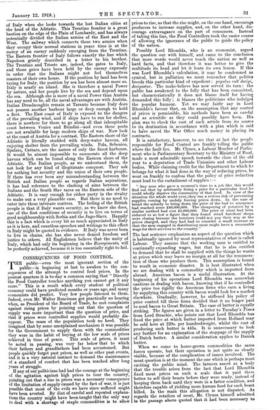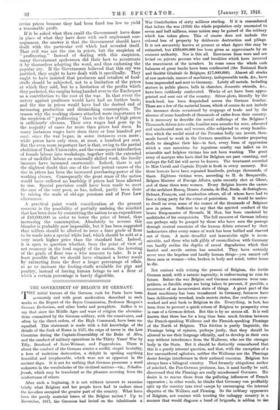CONSEQUENCES OF FOOD CONTROL. T HE public—even the most ignorant section
of the public—is beginning at last to awaken to the con- sequences of the attempt to control food prices. In the poorest quarters it is to-day a common saying that " Directly the Food Controller touches anything you cannot get it any more." This is a result which every student of political economy could have predicted months or years ago, and many economists did predict. Very few people listened to them. Indeed, even Mr. Walter Runciman got practically no hearing when, as President of the Board of Trade, he met complaints against rising prices by pointing out that the question of supply was more important than the question of price, and that if prices were controlled supplies would probably dis- appear. The mass of the population took no heed. They imagined that by some unexplained mechanism it was possible for the Government to supply them with the commodities they were in the habit of buying at the low scale of prices achieved in time of peace. This scale of prices, it must be noted in passing, was very far below that to which their fathers and grandfathers had been accustomed. But people quickly forget past prices, as well as other past events, and it is a very natural instinct to demand the maintenance of a standard of comfort that has been reached after long years of struggle. If any of our politicians had had the courage at the beginning of the agitation against high prices to tour the country, pointing out that a rise in prices was a necessary consequence of the limitation of supply caused by the fact of war, it is just possible that most of the evils we have since suffered might have been averted. By dint of careful and repeated explana- tions the country might have been taught that the only way to deal with a shortage of staple commodities is to allow prices to rise, so that the rise might, on the one hand, encourage producers to increase supplies, and, on the other hand, dis- courage extravagance on the part of consumers. Instead of taking this line, the Food Controllers took the easier course of allowing the ignorance of the public to guide the policy of the nation.
Possibly Lord Rhondda, who is an economist, argued the question out with himself, and came to the conclusion that mere words would never teach the nation so well as hard facts, and that therefore it was better to give the multitude its head and let it learn its own lesson. If this was Lord Rhondda's calculation, it may be condemned as cynical, but in palliation we must remember that politics breeds this particular kind of expedient : populus vult deciptafur. The make-believe has now served its turn : the public has awakened to the folly that has been committed, but characteristically it does not blame itself for having demanded this folly ; it blames the politicians who indulged the popular humour. Yet we may fairly say in Lord Rhondda's favour that, on the assumption that any control of prices is permissible, his methods have been as careful and as scientific as they could possibly have been. His plan was to check the cost of each article from its source to its destination in accordance with a plan which is said to hEive saved the War Office much money in placing its contracts.
It is satisfactory, however, to see that at last the people responsible for Food Control are frankly telling the public where the fault lies. Mr. Clynes, a Labour Member of Parlia- ment who is Parliamentary Secretary to the Ministry of Food, made a most admirable speech towards the close of the old year to a deputation of Trade Unionists and other Labour bodies. While claiming credit for the Department to which he belongs for what it had done in the way of reducing prices, he went on frankly to confess that the policy of price reduction must lead to the curtailment of supplies :- " Any man who gave a moment's time to a job like this would find out that by arbitrarily fixing a price for a particular food ho could wholly deprive the community of that food. In view of the situation the whole world over, they ran a serious risk of preventing supplies coming by unduly forcing prices down. In the case of bread the subsidy to bring down the price of the loaf to ninopence had reached some £40,000,000. The cheapening of potatoes by a similar method had cost £5,000,000. The price of meat' had been reduced to so low a figure that they found retail butchers' shoos were closing because the butchers could not pay their way at the prices charged, and they had had to consider a small increase so that the men engaged in distributing meat might have a reasonable wage for their services to the country."
The last sentence emphasizes an aspect of the question which is habitually ignored by most representatives of what is called Labour. They assume that the working man is entitled to continually expanding wages, but that he is also entitled to demand that he shall be supplied with the things he wants at prices which may leave no margin at all for the remunera- tion of those who produce them. This assumption is bound to result in economic disaster. It is best illustrated when we are dealing with a commodity which is imported from abroad. Amerioan bacon is a useful illustration. At the beginning of his operations Lord Rhondda was somewhat cautious in dealing with bacon, knowing that if he controlled the price too rigidly the American firms who earn a living by supplying this country with bacon would look for a market elsewhere. Gradually, however, he stiffened his policy of price control till these firms decided that it no longer paid to send bacon to Great Britain. The case of butter is equally striking. The figures are given in a letter to Tuesday's Times from Lord Strachie, who points out that Lord Rhondda has fixed the price at which butter imported from Holland may be sold here at 229s. per hundredweight, whilst the cost of producing such butter is 445s. It is unnecessary to look any further for an explanation of the stoppage of the supply of Dutch butter. A similar consideration applies to Danish butter.
When we come to home-grown commodities the same forces operate, but their operation is not quite so clearly visible, because of the complication of issues involved. The meat question is at the moment the one which is perhaps most exciting the public mind. The farmers assert as a body that the trouble arises from the fact that Lord Rhondda fixed meat prices on such a scale that it paid them better to sell their beasts before they were ready, instead of keeping them back until they were in a fatter condition, and therefore capable of yielding more human food for each beast killed. In the main this allegation is not disputed. As regards the retailers of meat, Mr. Clynes himself admitted in the passage above quoted that it had been necessary to revise prices because they had been fixed too low to yield a reasonable profit.
If it be asked what then could the Government have done in place of what they have done with such unpleasant con- sequences, the answer is that the Government should have dealt with the particular evil which had revealed itself. That evil was not the rise in prices, but the suspicion of " profiteering." Instead of dealing with this suspicion, many Government spokesmen did their best to accentuate it by themselves adopting the word, and thus endorsing the popular cry. If the Government believed that this cry was justified, they ought to have dealt with it specifically. They ought to have insisted that producers and retailers of food- stuffs should be subjected, not to a limitation of the prices at which they sold, but to a limitation of the profits which they pocketed, the surplus being handed over to the Exchequer as a contribution to the cost of the war. In that event the outcry against profiteers would have had no further basis, and the rise in prices would have had the desired end of increasing production and diminishing consumption. The reason why the working classes attached more importance to the suspicion of " profiteering " than to the fact of high prices is sufficiently obvious. Their own wages had gone up in the majority of cases far more than prices had risen. In many instances wages have risen three or four hundred per cent. since the war began, in some instances even more ; while prices have only risen, at most, a hundred per cent. But the even more important fact is that, owing to the partial abolition of Trade Union rules, and the consequent introduction of female labour into workshops, together with the extended use of unskilled labour on nominally skilled work, the family incomes have increased enormously. Indeed, there is not the slightest doubt that one of the most potent causes of the rise in prices has been the increased purchasing-power of the working classes. Consequently the great mass of the nation would have suffered no hardship if prices had been allowed to rise. Special provision could have been made to meet the case of the very poor, as has, indeed, partly been done by raising the scale of old-age pensions and of Poor Law allowances.
A practical point worth consideration at the present moment is the possibility of partially undoing the mischief that has been done by committing the nation to an expenditure of £40,000,000 in order to lower the price of bread, thus increasing the consumption. Absolutely to reverse this blunder is probably now impossible, but it has been suggested that millers should be allowed to issue a finer grade of flour to be made into a special white loaf, which should be sold at a very much higher price than the standard loaf. Indeed, it is open to question whether, from the point of view of net economy in the food supply of the nation, the lowering of the grade of flour was a wise measure to take. It is at least possible that we should have obtained a better result by extracting from the flour a larger percentage of offals, so as to increase the feeding-stuffs available for pigs and poultry, instead of forcing human beings to eat a flour of which a certain percentage is barely digestible.



























 Previous page
Previous page